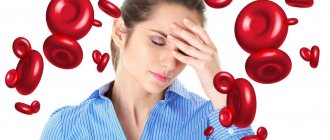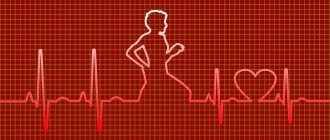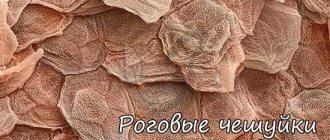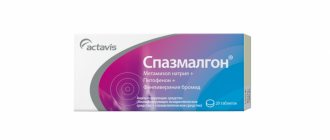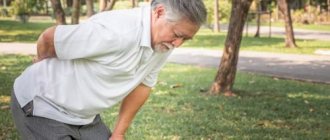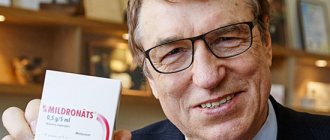Blood thinners
Antithrombotic drugs are used for various cardiac diseases to prevent blood clots, heart attack or stroke.
For palpitations, they are prescribed if atrial fibrillation (atrial fibrillation) is diagnosed. In this case, chaotic contractions of the atria create conditions for the “churning” of blood clots inside them, which can enter the arterial bed and clog a large vessel feeding an organ. Antithrombotic drugs do not have the property of slowing heart rate.
For atrial fibrillation, the following medications are prescribed to prevent severe complications:
- warfarin;
- a combination of acetylsalicylic acid and clopidogrel (in extremely rare cases, if it is impossible to use other means);
- dabigatran etexilate (Pradaxa);
- apixaban (Eliquis);
- rivaroxaban (Xarelto).
These medications are not prescribed to all patients. There are strict conditions for their use, so independent use of such drugs is unacceptable.
We recommend reading about arrhythmia and bradycardia at the same time. You will learn about the types and causes of arrhythmia against the background of bradycardia, signs of arrhythmia and bradycardia, as well as treatment for bradycardia with arrhythmia.
And here is more information about Anaprilin for arrhythmia.
Anti-palpitation pills are selected by a cardiologist individually for each patient. Despite the variety of relevant medications, a limited number of medications are used to treat each type of arrhythmia. Treatment for palpitations should be carried out under the control of daily ECG monitoring, and self-administration of such drugs is unacceptable.
What is the essence of the problem?
Normally, a person does not feel the beating of his heart - it beats quietly and measuredly, doing its work unnoticed by others. In a calm state, which is called normal, the heart beats at a rhythm of 60-80 beats per minute. The norm, of course, can vary depending on the constitution of a person, his lifestyle, age and other factors. So, for example, for athletes a normal heartbeat may be a pulse of 40 beats.
What causes the heart to age? Unobvious reasons that age an important organ Read more
Naturally, when your heart suddenly and unexpectedly begins to pound so that you can feel it, and even does it extremely quickly, there are many reasons for concern.
So why does the heart suddenly start beating too fast? “This state may be due to fear or some other experience. For example, a similar situation can be observed after some overly emotional conversation. The culprit here is the hormone adrenaline, which stands out against the background of the experience. Also, the heart can beat too quickly due to a disease such as heart rhythm disturbance. The latter occurs due to the development of ischemic disease. Therefore, even if it seems to you that you are healthy, but such a manifestation occurs, you should see a doctor,” says cardiologist, leading researcher at the Institute of Preventive Medicine, expert at the National Health League Olga Molchanova .
Also, sometimes the list of problems that cause such a manifestation includes malfunctions of the digestive system, for example, overeating or increased gas formation in the intestines, active physical activity, for example, after climbing the stairs too vigorously and quickly, excessive consumption of caffeinated drinks - tea, coffee, etc., taking a number of medications.
Reach the heart. How to adjust your heart rate at home? More details
Microelements for the heart with tachycardia
Vitamins and minerals have a strong impact on the functioning of the cardiovascular system. Micronutrient deficiency very often causes tachycardia and arrhythmia. Therefore, to prevent the development of such a situation, drugs for tachycardia are used in the form of vitamin and mineral complexes. Minerals are responsible for the functioning of the heart and blood vessels:
- magnesium, which prevent blood clots by normalizing metabolic processes and controlling blood viscosity;
- calcium, which normalizes myocardial contractile function;
- phosphorus – a conductor of nerve impulses;
- selenium, which increases local immunity, providing protection to heart cells and blood vessels;
- potassium that accompanies the generated electrical impulse through the myocardial conduction system.
Common causes of heart palpitations
Even a healthy person can feel increased heartbeat. This is most common for people with increased nervous sensitivity. The following can lead to heart palpitations:
- significant physical effort;
- rapid rise to altitude;
- physical activity in a hot and stuffy environment (lack of oxygen leads to increased heart function);
- sharp mental stress (fear, excitement, etc.);
- consuming large amounts of foods high in caffeine (coffee, tea, Coca-Cola);
- certain medications (in particular, cold remedies);
- digestive disorders (for example, flatulence, as a result of which the diaphragm appears slightly elevated).
Palpitations may be felt when the temperature is high (patients with a fever often feel palpitations).
Emergency care for tachycardia
At home, if tachycardia occurs, the following measures are taken:
- you need to take a horizontal position,
- you can drink a sedative of herbal origin,
- If the patient has previously had an attack of tachycardia, the cause is known and the patient has recommendations for treatment, then you can take the medicine that was prescribed by the doctor to stop the tachycardia.
If the measures taken do not lead to restoration of the heart rhythm, then it is necessary to call an ambulance.
When to see a doctor?
The cardiologist notes that you should contact a doctor without waiting for any additional signals from the body - just a rapid heartbeat will be enough to go to the appointment. “The doctor will prescribe an electrocardiogram to check the functioning of the heart, may suggest daily monitoring of the heart rhythm, and based on the results will make a decision. It is even possible that this is atrial fibrillation, which is not only treated with medications, but is also offered surgical intervention. By the way, it is good when a doctor suggests surgery, but patients often have a natural fear of this. However, it is worth understanding that surgical intervention also has certain contraindications, so it cannot always be carried out. Then they will use only drug therapy with special cardiac antiarrhythmic drugs,” says Olga Molchanova.
As a rule, if such a heartbeat was a one-time occurrence and does not occur again, there is no need to worry. But at the same time, there is no need to attribute the appearance of increased heart rate to emotions and fears all the time. After all, excessive emotionality and stress can become a trigger point for a pathological problem. And here again you need to go to the doctor.
Cardiologist Igor Zhirov: “Cardiological medications must be taken for a long time” Read more
Low blood pressure with tachycardia
First aid is as follows:
- you need to lie down and raise your legs,
- drink sweet tea. The use of coffee and caffeinated drinks is prohibited,
- take a deep breath and hold your breath for a while,
- It is possible to use sedatives - motherwort tincture.
If the condition does not improve, lethargy, weakness, and dizziness appear, then it is necessary to urgently call an ambulance.
The hospital will conduct a set of necessary examinations to determine the cause of tachycardia due to hypotension. Based on the data obtained during diagnosis, a diagnosis is made and a treatment plan is prescribed.
Treatment is mainly aimed at eliminating the etiological factor that caused the increased heart rate. The complex of treatment measures also includes taking vitamins and physiotherapeutic procedures.
- Tachycardia folk treatment - healthy lifestyle recipes
Prevention of tachycardia
Since tachycardia itself is not a disease, there is no specific prevention for this condition. Primary preventive measures consist of maintaining a healthy lifestyle, daily routine and proper rest - that is, the same as for the prevention of any heart failure.
Secondary preventive measures that should be followed in case of already established heart pathology imply more serious lifestyle adjustments, drug therapy prescribed by a doctor (if necessary, surgical interventions), as well as regular medical examinations.
Review of drugs for tachycardia
Medications are prescribed to normalize the pulse and control heart contractions. When choosing the most effective remedy, the doctor takes into account the degree of progression of the disease, the presence of other pathologies and contraindications. Therapy is carried out under outpatient supervision of a specialist.
When the heart rate increases, it is necessary to take suitable antiarrhythmic drugs, which are divided into several groups. Drug therapy is prescribed individually for each patient.
Membrane stabilizing
The body’s reaction to membrane-stabilizing drugs is that the heart begins to beat more slowly. This is due to a disruption in the transport of potassium, sodium and calcium ions, which is achieved under the influence of the active components included in the preparations. In this case, there is a decrease in excitability and a weakening of contractions.
Among the most effective remedies for high pulse membrane-stabilizing action are:
- " Metostabil " (oral pulse tablets) - the dosage is gradually increased from 125-250 mg until a therapeutic effect is obtained. It is not recommended to take during pregnancy, lactation, or with liver and kidney failure.
- “ Etatsizin ” - you need to take tablets for tachycardia 50 mg three times a day. If the expected result is not achieved, the dosage is increased. You can take no more than 300 mg per day, divided into 3 doses. The drug is not recommended for myocardial hypertrophy, in the post-infarction state and for children under 18 years of age.
- “ Novocainamide ” - drink 0.25-1.00 g every 3-6 hours. If there is no result, the dosage is increased to 3 mg per day. Contraindications include heart failure, myocardial infarction and renal failure.
Beta blockers
Medicines developed on the basis of substances that block adrenergic receptors. Such drugs are used for hypertension because they affect the functioning of the nervous system. Beta blockers relieve pain in the heart and protect against atherosclerosis.
The action of the drugs is aimed at reducing the myocardial oxygen demand to reduce heart rate and support coronary blood flow. The active substances included in the composition prevent the formation of blood clots and the progression of the pathological process. The use of beta blockers reduces the incidence of heart attacks and reduces the likelihood of sudden death.
Cardiac glycosides (CG) to reduce heart rate
The pharmacological effect of cardiac glycosides is to change the basic functions of the heart. Under their influence, heart contractions increase, which leads to an increase in the volume of blood thrown into the aorta. The heart rate slows down, which increases blood flow to the heart ventricles.
The effect that SGs have on blood pressure is variable. With normal blood pressure levels, no changes are observed with the use of cardiac glycosides. The drugs have a pronounced calming effect on the central nervous system (CNS).
Cardiac glycosides that are prescribed for tachycardia:
- Sinus bradycardia in children: root causes of development, ECG signs, treatment
- "Digoxin";
- "Strophanthin";
- "Korglikon".
List of medications prescribed for heart rhythm disorders
The heart rhythm is controlled by special electrical currents that follow a given path. With arrhythmia, electric currents stray from the established route. Instead, electrical signals travel chaotically through the atria. This is what makes the heart beat chaotically. Drugs that are prescribed to treat problems with heart rhythm belong to the group of antiarrhythmics.
2 main types of drugs are used for heart rhythm disturbances
There are two main types.
Sodium channel blockers
Drugs of this subtype directly control heart rhythm. Mechanism of drug influence: active substances regulate the rhythm of contractions and the speed at which the heart muscle conducts electrical impulses. The active ingredients are focused on regulating electrical activity in the sodium channels of heart cells.
Trade names of such medicines:
- disopyramide (rhythmodan);
- mexiletine (mexarhythm);
- quinidine;
- procainamide (novocainomide);
- propafenone;
- flecainide.
Potassium channel blockers
Like sodium channel blockers, potassium channel blockers also help control heart rate. These are drugs that reduce the electrical conductivity of the heart by interfering with potassium channels.
List of such medicines:
- amiodarone (cordarone);
- dronedarone (multac);
- sotalol sandoz.
It is worth noting that dronedarone (multac) is an innovative drug that is used only to prevent arrhythmia in people who have already had a similar diagnosis in the past. It is not recommended to use this drug for prophylaxis. But sotalol Sandoz tablets, which reduce heart rate, combine the functions of a beta blocker and a potassium channel blocker.
